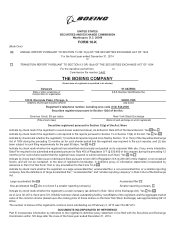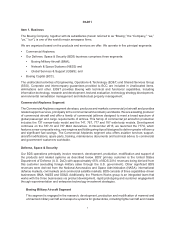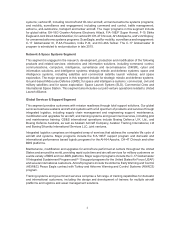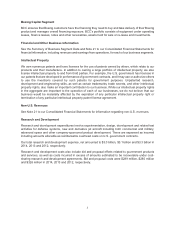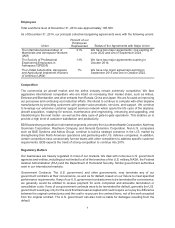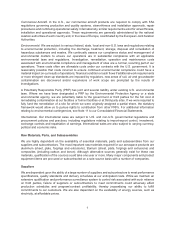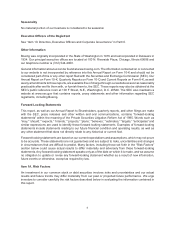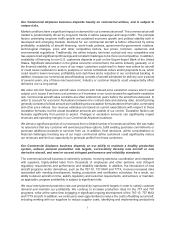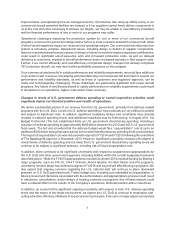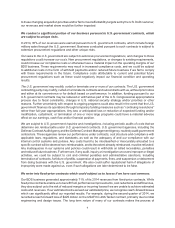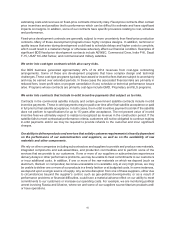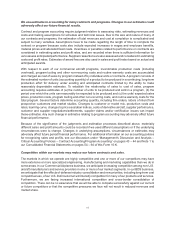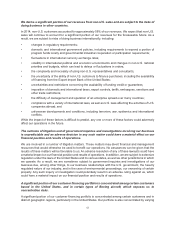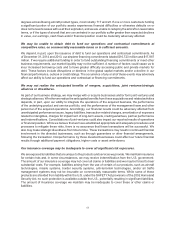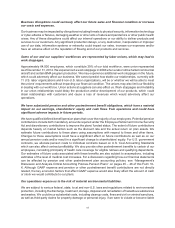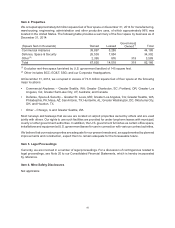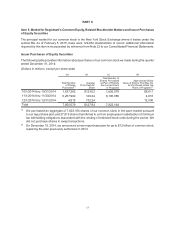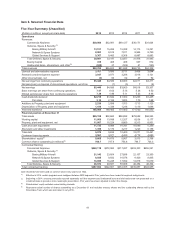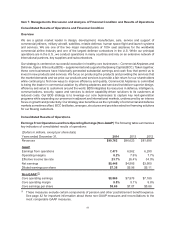Boeing 2014 Annual Report Download - page 21
Download and view the complete annual report
Please find page 21 of the 2014 Boeing annual report below. You can navigate through the pages in the report by either clicking on the pages listed below, or by using the keyword search tool below to find specific information within the annual report.9
to these changing acquisition priorities and/or fail to meet affordability targets set by the U.S. DoD customer,
our revenues and market share would be further impacted.
We conduct a significant portion of our business pursuant to U.S. government contracts, which
are subject to unique risks.
In 2014, 30% of our revenues were earned pursuant to U.S. government contracts, which include foreign
military sales through the U.S. government. Business conducted pursuant to such contracts is subject to
extensive procurement regulations and other unique risks.
Our sales to the U.S. government are subject to extensive procurement regulations, and changes to those
regulations could increase our costs. New procurement regulations, or changes to existing requirements,
could increase our compliance costs or otherwise have a material impact on the operating margins of our
BDS business. These requirements may result in increased compliance costs, and we could be subject
to additional costs in the form of withheld payments and/or reduced future business if we fail to comply
with these requirements in the future. Compliance costs attributable to current and potential future
procurement regulations such as these could negatively impact our financial condition and operating
results.
The U.S. government may modify, curtail or terminate one or more of our contracts. The U.S. government
contracting party may modify, curtail or terminate its contracts and subcontracts with us, without prior notice
and either at its convenience or for default based on performance. In addition, funding pursuant to our
U.S. government contracts may be reduced or withheld as part of the U.S. Congressional appropriations
process due to fiscal constraints, changes in U.S. national security strategy and/or priorities or other
reasons. Further uncertainty with respect to ongoing programs could also result in the event that the U.S.
government finances its operations through temporary funding measures such as “continuing resolutions”
rather than full-year appropriations. Any loss or anticipated loss or reduction of expected funding and/or
modification, curtailment, or termination of one or more large programs could have a material adverse
effect on our earnings, cash flow and/or financial position.
We are subject to U.S. government inquiries and investigations, including periodic audits of costs that we
determine are reimbursable under U.S. government contracts. U.S. government agencies, including the
Defense Contract Audit Agency and the Defense Contract Management Agency, routinely audit government
contractors. These agencies review our performance under contracts, cost structure and compliance with
applicable laws, regulations, and standards, as well as the adequacy of and our compliance with our
internal control systems and policies. Any costs found to be misclassified or inaccurately allocated to a
specific contract will be deemed non-reimbursable, and to the extent already reimbursed, must be refunded.
Any inadequacies in our systems and policies could result in withholds on billed receivables, penalties
and reduced future business. Furthermore, if any audit, inquiry or investigation uncovers improper or illegal
activities, we could be subject to civil and criminal penalties and administrative sanctions, including
termination of contracts, forfeiture of profits, suspension of payments, fines, and suspension or debarment
from doing business with the U.S. government. We also could suffer reputational harm if allegations of
impropriety were made against us, even if such allegations are later determined to be false.
We enter into fixed-price contracts which could subject us to losses if we have cost overruns.
Our BDS business generated approximately 71% of its 2014 revenues from fixed-price contracts. While
fixed price contracts enable us to benefit from performance improvements, cost reductions and efficiencies,
they also subject us to the risk of reduced margins or incurring losses if we are unable to achieve estimated
costs and revenues. If our estimated costs exceed our estimated price, we recognize reach-forward losses
which can significantly affect our reported results. For example, during the second quarter of 2014, we
recorded a reach-forward loss of $425 million on the USAF KC-46A Tanker contract, primarily due to initial
engineering and design issues. The long term nature of many of our contracts makes the process of


